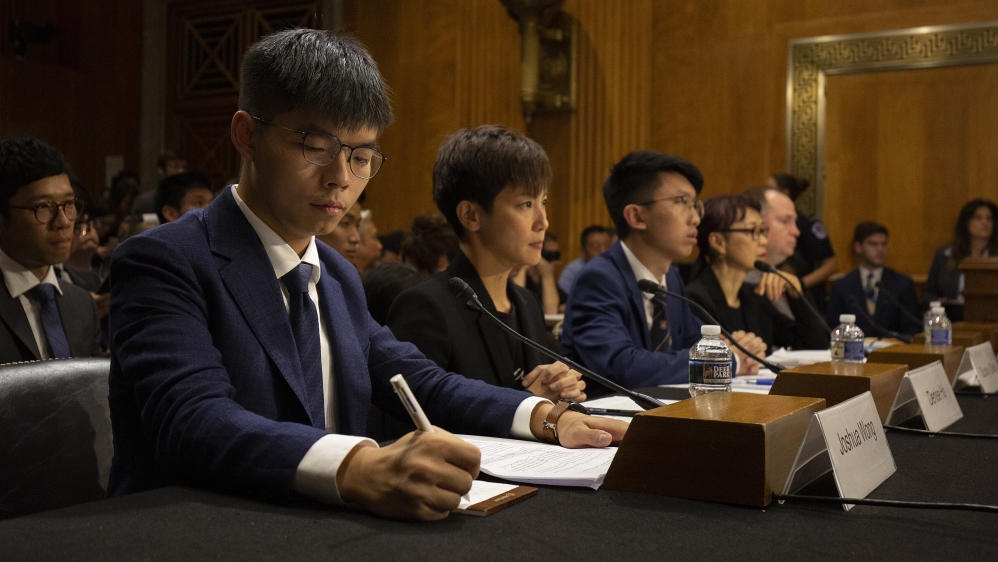
The House of Representatives in the United States on Tuesday passed legislation to show support for pro-democracy protesters in Hong Kong, drawing swift condemnation from China, which said its relationship with the US would be damaged if the bills were to become law.
The Hong Kong Human Rights and Democracy Act, which protesters had urged legislators to pass, would end the Chinese city’s special trading status with the US unless the State Department certified annually that the authorities were respecting human rights and the rule of law.
A second measure, the Protect Hong Kong Act, would bar commercial exports of military and crowd-control items such as teargas.
The third is a non-binding resolution recognising Hong Kong’s relationship to the US, condemning Beijing’s “interference” in its affairs, and supporting the right of the city’s residents to protest.
China’s Foreign Ministry said in a statement it was “resolutely opposed” to the bills and urged US legislators to stop interfering in Hong Kong. It has accused “external forces” of heightening months of unrest in the semi-autonomous city.
House Speaker Nancy Pelosi called the bills important reminders of US support for human rights in the face of significant commercial interests in China.
“If America does not speak out for human rights in China because of commercial interests, then we lose all moral authority to speak out on behalf of human rights any place in the world,” she said.
Pelosi said the bravery of young protesters in Hong Kong stood in contrast to “the cowardly government that refuses to respect the rule of law” and the “one country, two systems” policy that was supposed to ensure a smooth political transition after Britain returned the former colony to China in 1997.
China warning
All three bills had cross-party support and were approved in separate voice votes.
The Senate has not yet scheduled votes on the legislation, which would send the measures to the White House for US President Donald Trump to sign into law – or veto.
A Foreign Relations Committee aide said votes on Hong Kong-related measures were expected in the chamber in the coming weeks.
China’s foreign ministry spokesman Geng Shuang said China’s relationship with the US would be damaged if the measures were to become law.
Hong Kong’s government said, “foreign legislatures should not interfere in any form.”
Christopher Smith, a Republican and one of the lead sponsors of one of the Hong Kong bills, said they were necessary to hold China to account.
Under President Xi Jinping, human rights abuses in China had significantly worsened, Smith said.
China “excels in crushing bodies, shattering bones, torturing dissidents and filling concentration camps -massive crimes against humanity for which there has been little or no accountability or sanction,” Smith said, echoing comments made by Xi while on a visit to Nepal over the weekend.
“Today we’re simply urging the Chinese president and the Hong Kong Chief Executive, Carrie Lam, to faithfully honour the government’s promises.”
Protesters in Hong Kong first took to the streets in June, calling on the government to withdraw a bill that would have allowed people to be sent to mainland China for trial.
Increasing violence
Last month, Lam finally agreed to shelve the bill – it will be formally withdrawn at the Legislative Council this week – but the demonstrations have continued with the protesters’ demands expanding to include the right to elect their leaders and an investigation into alleged police brutality.
Violence has broken out in districts across Hong Kong with small groups of protesters throwing bricks and petrol bombs, and police using tear gas, water cannon, rubber-coated bullets and, more recently, live rounds.
An 18-year-old was shot in the chest earlier this month, and a 14-year-old in the thigh last week. Police say they have arrested more than 2,300 people as a result of the protests.
Beijing rejects claims that it is meddling in Hong Kong and accuses Western countries, such as the US and Britain of stirring up trouble.
The House also passed a measure commending Canada’s government in a dispute over the extradition of Huawei Technologies’ chief financial officer, Meng Wanzhou.
Meng is charged in the US over Huawei’s business in Iran, which is under US sanctions. Meng has said she is innocent and is out on bail, living at her home in Vancouver.














